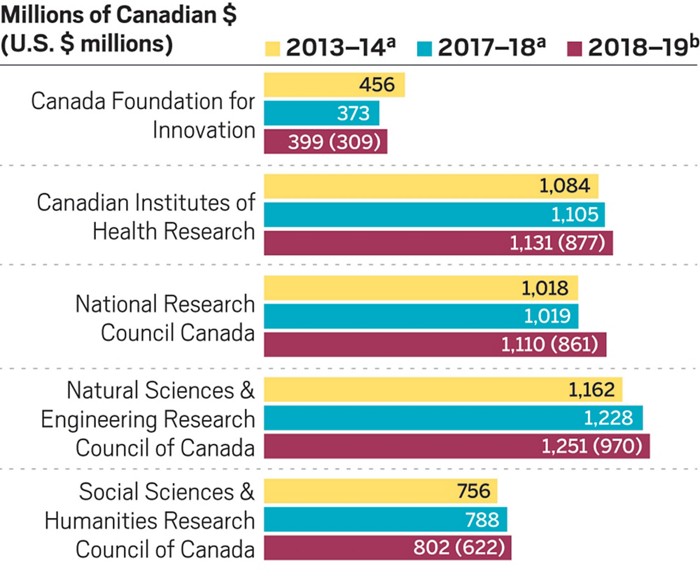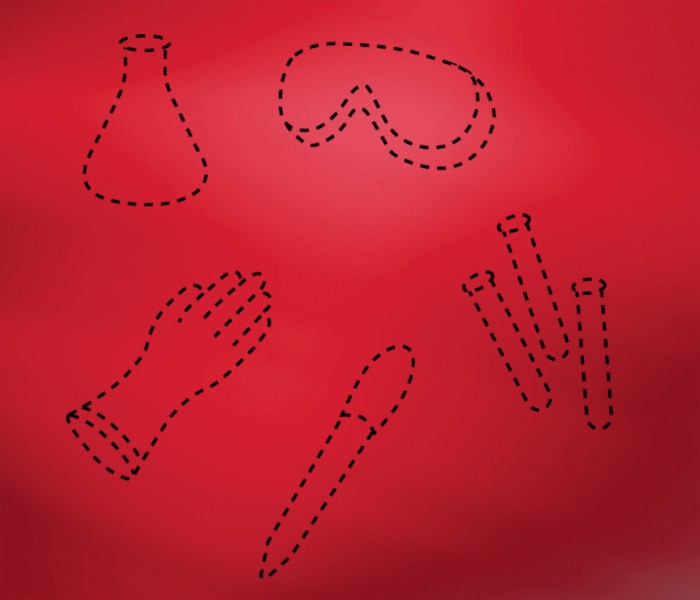Advertisement
Grab your lab coat. Let's get started
Welcome!
Welcome!
Create an account below to get 6 C&EN articles per month, receive newsletters and more - all free.
It seems this is your first time logging in online. Please enter the following information to continue.
As an ACS member you automatically get access to this site. All we need is few more details to create your reading experience.
Not you? Sign in with a different account.
Not you? Sign in with a different account.
ERROR 1
ERROR 1
ERROR 2
ERROR 2
ERROR 2
ERROR 2
ERROR 2
Password and Confirm password must match.
If you have an ACS member number, please enter it here so we can link this account to your membership. (optional)
ERROR 2
ACS values your privacy. By submitting your information, you are gaining access to C&EN and subscribing to our weekly newsletter. We use the information you provide to make your reading experience better, and we will never sell your data to third party members.
Research Funding
U.S. and U.K. political climates are driving scholars to Canada
‘Brain gain’ program brings high-profile international researchers to Canadian universities
by Sharon Oosthoek, special to C&EN
May 9, 2018
| A version of this story appeared in
Volume 96, Issue 20

Harvard chemist Alán Aspuru-Guzik has spent nearly half his life—20 years—in the U.S. He is sad to leave but feels he must.
“The political dialogue is broken,” says Aspuru-Guzik, who was born in the U.S. and raised in Mexico. “People are not talking to each other; they are shouting at each other. I don’t want my kids to grow up in that kind of country.”

So when Canada came knocking with a Canada 150 Research Chair at the University of Toronto, he accepted: “It looked like Canada could be a good home,” he says. “It’s a very inclusive society and has a commitment to funding basic science.”
Aspuru-Guzik is one of 25 international researchers to be granted funding through the Canada 150 Research Chairs Program, which was announced as part of the country’s 150th anniversary celebrations last year. Federal Minister of Science Kirsty Duncan called the program a “brain gain” for Canada when she announced the appointments on March 29.
The chair positions are for seven years and come with either Can$350,000 or $1 million (US$270,000 or $780,000) annually, for a program total of Can$117.6 million in one-time funding. The money funds research and in some cases salary, depending on the scholar and institution. Thirteen of the scholars hail from the U.S., six from the U.K., two from South Africa, and one each from Austria, Australia, and New Zealand. One chair recipient is not yet named publicly.
More than half the researchers selected for the program are women, and just under half are Canadians returning home. The researchers represent a wide range of fields, including microbiology, evolutionary genomics, economics, psychology, and chemistry.
Aspuru-Guzik’s specialty is theoretical physical chemistry. His work involves developing and applying quantum computer algorithms to simulate the behavior of molecules and materials. His goal is to “change the way we design chemicals.”
In Toronto, his team will combine robotics, artificial intelligence, and quantum chemistry to develop labs that can drive themselves to create novel molecules. Applications for the molecules include organic light-emitting diodes, batteries, and solar cells.

Like Aspuru-Guzik, environmental economist Carolyn Fischer has spent the past 20 years in the U.S. She works at a Washington, D.C.-based think tank, Resources for the Future, that is renowned for its environmental, energy, and natural resource scholarship.
But she is relieved to be going back to the country of her birth. She too is taking up a Canada 150 Research Chair—in her case, at the University of Ottawa.
“Trump has a lot to do with it,” says Fischer, a citizen of both Canada and the U.S. “The current administration is leading the U.S. backward on environmental and energy—as well as many other—issues, while the Canadian government is becoming a leader on climate policy.”
Fischer is an expert in the role that technology and carbon-pricing policies play in lowering emissions and has influenced emissions trading programs in California and New Zealand. She says economists have long advocated for policies to charge greenhouse gas emitters for their emissions; however, only about 15% of global annual emissions are covered by such programs.
“We see much more emphasis on incentivizing clean technologies than disincentivizing dirty ones. My research explores why, and what are some of the costs—and benefits—as a consequence,” she says.

Duke University biomathematician Anita Tam Layton also says President Donald J. Trump’s election is part of the reason she has accepted a chair appointment at the University of Waterloo.
“It does affect the research environment,” she says. “The feeling in the U.S. is not inclusive.”
Tam Layton is a Canadian citizen who did her graduate work in Canada. Her parents live in Toronto. She says she likes the idea of coming back to a country that marks its 150th birthday with a large investment in science. “I mean, what other country does that? This is more important than Trump,” she says.
At the University of Waterloo, she will continue investigating the molecular and physiological mechanisms involved in kidneys’ reaction to a novel drug for diabetes. Her computer simulations are designed to track the drug’s impact on kidneys’ metabolism and its potential side effects.

Politics was not a concern of researchers in just the U.S. “Brexit and the associated uncertainties with leaving the European Union were a key factor,” says University of Bristol materials chemist Ian Manners about his move to the University of Victoria through the research chairs program. “The EU has been very good for the U.K. Unfortunately, largely due to the U.K. media, just over 50% of the U.K. population doesn’t realize it.”
In Victoria, Manners will continue his work using crystallization to create nanoparticles. He and his team aim to control the particles’ shape, size, and composition to control the way the particles behave. Because nanoparticles can be made from electronically conductive or biodegradable materials, Manners’s work could have applications in electronics, such as in nanowires, and in biomedicine, such as in drug delivery vehicles.
Among the Canada 150 Research Chair recipients who spoke with C&EN, those coming from the U.S. are currently well funded, and money was not a motivating factor to move. For Manners, however, the funding provided an additional pull. “The seven years of funding will provide highly flexible and unrestricted support,” he says, “especially with exploratory research funding under considerable pressure in the U.K.” Manners plans to keep a sizable research group at the University of Bristol for at least two more years but is looking forward to making Canada his home base. He holds dual Canadian and British citizenships.
The researchers interviewed by C&EN all intend to stay put in Canada beyond the seven-year terms. Manners and Fischer have commitments from their new universities to help them continue their work. Tam Layton already has her eye on granting agencies that could help after her appointment is up. Aspuru-Guzik is also confident he will find a way to keep his research going in Canada.
“I bribed my children with a Nintendo Wii and a dog,” he says. “I plan to stay.”
Sharon Oosthoek is a freelance journalist based in Toronto.





Join the conversation
Contact the reporter
Submit a Letter to the Editor for publication
Engage with us on Twitter